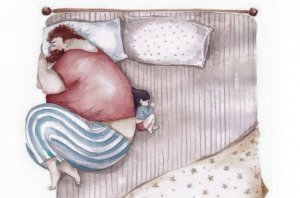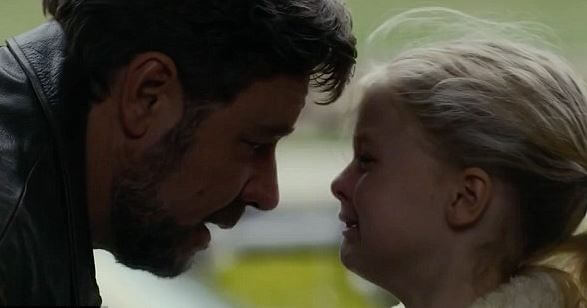Parents and Children: The Imprint of Parental Abandonment

The imprint left in a child by the experience of being abandoned by a parent leaves a huge emotional gap. This enormous hole ends up isolating us, depressing us and causing emotional breakdown in our personal reality on all levels.
Thanks to decades of attachment studies, we know that healthy affective bonds guarantee the development of a fulfilling life filled with healthy relationships, healthy self-esteem, and the security and trust of others. On the other hand, insecure attachment sets us on a path towards insecurity, low self-esteem and lack of trust towards those around us.
Negative affective bonds between parents and children create destructive behaviors and great anguish. Going through an exercise of introspection and subsequently distancing ourselves from this experience will help us to understand it and work on it to reach greater emotional freedom and, as a result, to organize our personality better (that is to say, our way of behaving with ourselves and our environment).
That’s why, in this article, we are going to try to shine some light on this subject to help redirect our emotional reality.

The difficulty of defining a parent and the relationship of abandonment
It is easier to talk about family relationships now than it used to be. However, when you’ve had to cope with an absent parent who abandoned the family home for whatever reason, you also have to contend with a definition of something which is indescribable.
Often in these cases, when someone is asked about their parent they can only hesitate, lower their gaze and respond vaguely with excuses. This clearly demonstrates the difficulty in defining the emotional vacuum and dealing with the scars left in us by abandonment.
In this regard we should highlight that there are many types of abandonment. In fact, we could speak of as many types as there are cases in the world. These are some of the most common ones:
- The emotionally absent but physically present parent. If we pay attention to the socio-emotional reality of our environment, we will understand that this type of upbringing has been very common over the years.
- The parent that abandoned us before, during and after childhood. The pain of being physically and emotionally abandoned by choice by our reference figures sows significant seeds in our process of growing up. It is difficult to handle the reality you have to live with in this case. Because… how do you assimilate the fact that someone who should accompany you for many years of your life chooses to distance him/herself from you in some way?
- The parent who abandoned us physically or emotionally during our youth or adulthood. This type of abandonment will most probably be branded as betrayal. It therefore needs to be processed verbally with a lot of awareness.
- The almost total absence of a parental figure. In this case there are several possibilities:
- The parent who died early and didn’t have the opportunity to play their role in our life.
- The parent who died but who we knew first. In this scenario, longing and idealization will create a characteristic hole.

Managing a destroyed or destructive bond
Psychological processing on both the emotional and mental levels doesn’t just depend on the child but also on the whole environment. The shadow of an absent parent always torments family life one way or another. It is not easy to accept that our father, our ideal role model alongside our mother, doesn’t stay in our life. That’s why his absence strongly affects our emotional development.
On the other hand, depending on our position in the family hierarchy, it is possible that other family members take on the role of parents through compassion or need; it may also be the case that we are the ones that feel the pressure to handle certain circumstances.
The eternal question of what we consider to be a father also stands out; a common dilemma with complicated implications. The natural thing is for the emotional father to also be the biological father, however as we can see this isn’t always the case.

We should highlight that we will acquire different qualities, tasks, obligations and roles that don’t correspond to us depending on the developmental stage we’re at and the circumstances of the abandonment. For example:
- If the parental figure is missing one way or another during our early childhood (0 – 6 years), it is difficult to achieve the emotional plenitude needed in this stage during which we build the foundations of our growth.
- If the abandonment occurs in the second stage of childhood (6 – 12 years), the difficulty in consolidating the foundation for healthy attachments will not be so strong (it won’t be destroyed). Also, in adolescence, a stage in which it is essential to have support, role models and clear boundaries, it is easy for the process of building a solid identity to break down.
- During childhood and adolescence, developmental stages in which the personality is not yet structured, the anxiety, sadness and pain of a loss will deeply mark our way of being and of relating with the world.
- Put another way, this is the source of an inner disconnect that naturally shouldn’t have happened. That’s why it’s an especially traumatic experience that will mark us to the core and affect our way of relating to others.
- When abandonment occurs during youth or even adulthood, the processing needed takes on other hues, because the absence and abandonment of the parent creates contradictions both internally and in the way of establishing relationships.
- It is common to be taken over by insecurity, mistrust and the fear of betrayal. Because irrefutable abandonment during adulthood is quickly processed as betrayal. In this case we need to go through a much more conscious emotional analysis and so we will feel the need to put it into words.
When we put it into words, the hues of abandonment are more raw, because we no long anesthetize the reality and instead we probably make it even darker. Either way, our armor becomes even harder, and at the same time more fragile, making the process of re-building even more complicated.
We know the secrets, we realize the reality and we know how to read between the lines, but we’re never prepared to let go of the idea of the father as mentor, protector and hero.

Relieve the pain to live with the loss
Take note that we didn’t say overcome the loss, but rather live with it. You can overcome the loss of your keys, or even our favorite toy, but overcoming the loss of a parent is impossible.
It is vital to understand this because if we try to convince ourselves that losing a parent won’t affect us, we’ll be building a castle in the clouds. It is utterly unrealistic to believe that something with so much emotional load can somehow not affect us.
Processing and managing the imprint of parental abandonment requires forgiveness at both the individual and family levels and this isn’t always easy to achieve. If our environment constantly punishes our father figure or if we observe great pain in our mother, our siblings or our grandparents, we will probably project this same pain within ourselves.
Becoming aware of this in itself is progress, because we tend to separate the pain of others from our own. Obviously the combination creates a cocktail which will in some way make us vulnerable forever.
But, if we fence off the bond of suffering and we consider each occurrence separately, we can achieve a greater understanding of what has happened. This will help us to stop storing up the pain and the emotions and to continue taking lighter steps along our emotional journey.
This text is provided for informational purposes only and does not replace consultation with a professional. If in doubt, consult your specialist.








